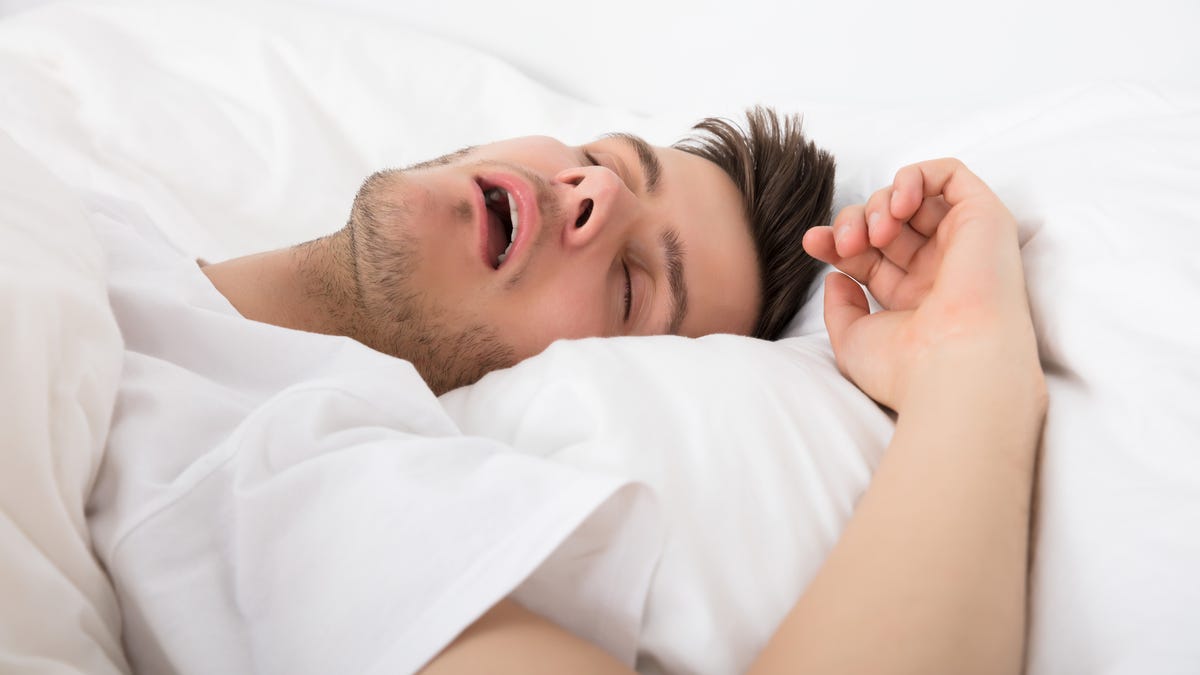5 Self-Help Tips To Stop Snoring Tonight
Snoring is disruptive for everyone. Thankfully, there are things you can do to stop snoring and sleep better.

Snoring results from air pushing through a partially blocked airway and vibrating the tissues of the throat. Occasional snoring is common -- practically everyone does it. However, persistent and regular snoring harms sleep quality and can cause drowsiness and fatigue. Your likelihood of health issues like high blood pressure or a heart attack also increases.
Whether snoring is just an annoyance you'd like to get rid of or you're trying to get better sleep, try these home remedy tips to stop snoring.
We also can show you how to fall asleep fast, get the most out of your sleep and which foods to eat to sleep well.
At-home tips to stop snoring
Change your sleeping position
Your sleeping position may be contributing to your snoring. Sleeping on your back increases the compression of your airways. It also allows your soft palate and tongue to fall backward and obstruct your airway, which is common for those with sleep apnea.
Sleeping on your side will help open your airways and reduce snoring. There are several ways to train yourself to sleep on your side. They include but are not limited to: sleeping on the couch for a narrow surface area, sleeping against a wall or using pillows to block your ability to roll over. Many people swear by the tennis ball trick, which involves attaching a tennis ball to the back of your shirt, so it's uncomfortable to sleep when you roll over.
Read more: Best Mattresses for Great Sleep
Elevate your head
Elevating your head can ease snoring by allowing your tongue and jaw muscles to move forward rather than fall back into your airways. There are specially designed pillows that help with this, or you can just stack your current pillows to achieve the same effect.
Read more: How to Shop for and Choose the Right Pillow
Make lifestyle changes
Your lifestyle plays a large role in how often you snore. Carrying extra weight can contribute to snoring as the fatty tissue in the neck can press against your throat. Experts recommend weight loss as one of the first changes to stop snoring. For some, losing as little as 5 to 8 pounds can decrease snoring.
Another lifestyle you can make is quitting smoking. Cigarette smoke can cause nasal congestion and irritate the nose and throat membranes. Alcohol can negatively affect your sleep in several ways, one of which is that it relaxes your airways and makes you snore. You should avoid alcohol at least 3 hours before bed to reduce snoring.
Open your nasal passages
There are several products on the market that you can use to stop snoring. The most popular are nasal strips that can reduce snoring by increasing the space in the nasal passage and making your breathing more effective. Nasal strips are worn across the bridge of the nose.
If nasal stips don't widen the nasal passage enough for your needs, you can use an external nasal dilator. While similar to nasal strips in appearance, external nasal dilators are a little more heavy-duty, with embedded plastic ribs in the adhesive that keep the airways open.
Internal nasal dilators are also available. The device is inserted in the nose and physically holds open the nasal passage.
Address your allergies
If you struggle with allergies, it's important to address your symptoms regularly so they don't impact your sleep. Allergies can reduce your nasal airflow and force you to breathe through your mouth, increasing the likelihood of snoring.
Over-the-counter allergy medications can help alleviate symptoms. There are also prescription options available.
Things to keep in mind when choosing an allergy medication:
- There are both drowsy and non-drowsy antihistamines available.
- Pay attention to how fast-acting the medication is. That will help you determine when to take it for the best results.
- What form do you want to take your medication? There are traditional pill medications and nasal sprays.
When is it time to see a doctor for snoring?
Snoring is common and can be linked to the causes mentioned above. But there are times when snoring can be a symptom of something more serious, like sleep apnea. Sleep apnea is a sleep disorder marked by loud snoring and interruptions in breathing during the night. People with sleep apnea wake up tired, suffer headaches or migraines and have difficulty concentrating.
Sleep apnea is associated with hypertension, cardiovascular disease, diabetes and stroke. If you think you have sleep apnea, it's essential you speak to your doctor for a diagnosis. The standard treatment for sleep apnea is a CPAP machine that blows air into your airways to keep them open all night.
Quick tips to make sleeping with a CPAP machine easy:
- Assess the mask style options. Some options offer more or less coverage than others.
- Once you've selected which mask fits your needs, you must ensure it fits. Make adjustments to straps while lying down, not standing up.
- Practice wearing your mask during the day to get used to wearing it at night.
Want more? Find out which habits are wrecking your sleep, how to power nap like a champ and which songs to add to your sleep playlist.

